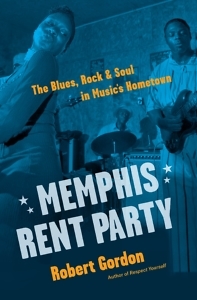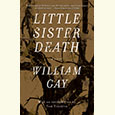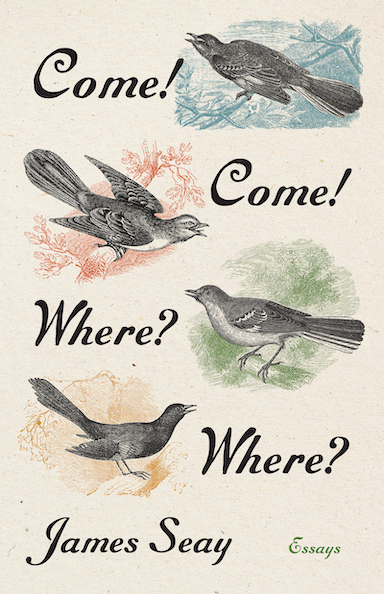Goin’ to Memphis Where the Beat is Tough
Robert Gordon’s Memphis Rent Party captures the grit and heart of the blues
In the preface of his new book, Memphis Rent Party: The Blues, Rock & Soul in Music’s Hometown, Robert Gordon describes a 1975 Rolling Stones concert he attended in Memphis when he was 14 years old. On that day, 50,000 people filled Memphis’s Memorial Stadium to witness the “World’s Greatest Rock ‘n’ Roll Band,” along with other superstar rock acts, but an octogenarian bluesman named Furry Lewi was the musician who made the biggest impression on Gordon.

“Furry’s playing was unlike anything I could have anticipated, the still, small voice after the raging storm. His rhythms were slow, his songs full of space, his notes floated in the air. His music summoned us listeners instead of dazzling us with its size and force,” Gordon writes. “[T]here was an immediacy to his art that the Stones’ big production could never match.”
For Gordon it was a revelation to realize that a man born in the nineteenth century, a man who had been playing the blues in Memphis beer joints, brothels, and back-porch parties for more than sixty years, was still alive and playing, hidden in plain sight on the streets of his own hometown. That awareness transformed Gordon from a standard-issue teenage rock fan into a seeker of something different. Gutbucket blues, deep soul, primal rock’n’roll—the musical forms filling the back alleys and easy-to-overlook juke joints of Memphis—were available to anyone with the knowledge and drive to seek them out.
Memphis Rent Party is a collection of stories, interviews, histories, and reviews from the four decades Gordon has spent tracking down and interviewing both musical legends and marginal characters. Drawn from magazine stories, liner notes, and unpublished pieces from Gordon’s personal files, the book chronicles a huge swath of Memphis’s musical and cultural history.
Gordon’s insightful writing and desire to understand his subjects is evident whether he focuses on acclaimed musical icons like Sun Records head Sam Phillips, demon-haunted blues pioneer Robert Johnson, rock’n’roll bad boy Jerry Lee Lewis, or more obscure figures like barrelhouse-piano player Mose Vinson, tragic soul singer James Carr, and avant-garde rockabilly performance artist Tav Falco. But Gordon doesn’t end with the mere discovery of unusual sounds and idiosyncratic personalities. Through interviews and research he seeks the heart and soul of both the music and the people creating it.
 Music journalists often hear an old disclaimer, most often attributed to comedic actor and musician Martin Mull: “Writing about music is like dancing about architecture.” It’s a funny comment, but it’s also needlessly reductive. Written words can’t recreate the groove, beat, and aural excitement of music, but good writing can evoke the same emotional impact, adding depth and understanding to the familiar or sparking excitement for the first time.
Music journalists often hear an old disclaimer, most often attributed to comedic actor and musician Martin Mull: “Writing about music is like dancing about architecture.” It’s a funny comment, but it’s also needlessly reductive. Written words can’t recreate the groove, beat, and aural excitement of music, but good writing can evoke the same emotional impact, adding depth and understanding to the familiar or sparking excitement for the first time.
Gordon excels at both tasks, bringing new insight to well-known music and placing the reader in a previously unknown place filled with the sound of a steady beat and the squeak of fingers across guitar strings. He does so by utilizing the same basic ingredients of great songs: rhythm, language, and metaphor.
A good example is Gordon’s profile of obscure Memphis blues band The Fieldstones. Although never signed to a major record label, they were undeniably musical megastars in their weekly performances at an off-the-beaten path Memphis juke joint, the J&J Lounge:
The Fieldstones weren’t known for their solos. The music came out as whole even when one member stepped forward. Joe Hicks, the vocalist/drummer, used to say, “Time to move on down the line,” and he’d tap the snare a couple of times… and the Fieldstones would fall back to their instruments. Bobby Carnes played the keyboard, and he rarely spoke, leaning into those fat church chords instead, the ones still smoky from Saturday night. Lois Brown, she played bass and had a beautiful smile. If the band got hot, she’d tug the string for the ceiling fan without missing a note. Lois was tough, and when acting as the band’s manager, she brooked no jive. But her playing made the music lithe. She didn’t move a lot, a little rocking to the beat, but there was a touch, jump to her jump, that made the bass—and that band—so sinuous. People who never danced would dance to the Fieldstones.
That ability to transport the reader from their comfortable chair to a smoky and sweaty nightclub in Memphis on a Friday night in 1980, when well-lubricated musicians were laying down a groove deeper than the muddy bottom of the Mississippi River, is the heart of great music writing. It’s a literary portrait of the soul that Gordon has been seeking since that hot July day in Memphis and which he shares with readers on every page of this marvelous collection.
[To read an excerpt from Memphis Rent Party, click here.]

Randy Fox is a freelance writer whose writing on music and pop culture has appeared in Vintage Rock, Record Collector, The East Nashvillian, Nashville Scene, Jack Kirby Collector, Hardboiled, and many other publications. He lives in Nashville.


